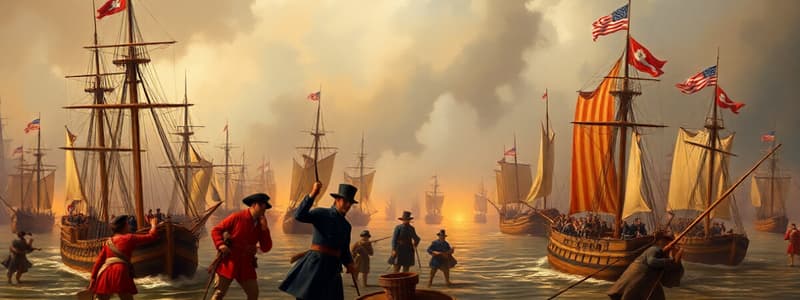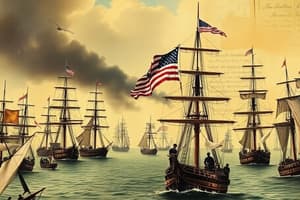Podcast
Questions and Answers
Match the events of the War of 1812 with their corresponding year:
Match the events of the War of 1812 with their corresponding year:
United States declares war on Britain = 1812 Perry defeats the British navy on Lake Erie = 1813 The British burn Washington, D.C. = 1814 American forces win the battle of New Orleans = 1815
Match the battles from the War of 1812 with their outcomes:
Match the battles from the War of 1812 with their outcomes:
Battle of Lake Erie = American victory Battle of Washington, D.C. = British victory Battle of New Orleans = American victory Battle of Baltimore = Stalemate
Match the following key terms with their definitions:
Match the following key terms with their definitions:
Frigate = Fast warship Privateer = A ship authorized to attack enemy ships Militia = A military force raised from the civil population Naval Blockade = An act of sealing off a place to prevent goods from entering or leaving
Match the outcomes of the War of 1812 with their themes:
Match the outcomes of the War of 1812 with their themes:
Match the following events with their corresponding descriptions:
Match the following events with their corresponding descriptions:
Match the following military leaders with their respective actions during the War of 1812:
Match the following military leaders with their respective actions during the War of 1812:
Match the following battles/events with their respective dates:
Match the following battles/events with their respective dates:
Match the following ships with their respective roles or actions:
Match the following ships with their respective roles or actions:
Match the following terms with their respective definitions:
Match the following terms with their respective definitions:
Match the following locations with their significance in the War of 1812:
Match the following locations with their significance in the War of 1812:
Match the following statements with the outcome of the American military effort in Canada during the War of 1812:
Match the following statements with the outcome of the American military effort in Canada during the War of 1812:
Match the following reasons with the American decision to reduce the size of the navy after the War of 1812:
Match the following reasons with the American decision to reduce the size of the navy after the War of 1812:
Match the following aspects of the War of 1812 with their respective significance in the context of the conflict:
Match the following aspects of the War of 1812 with their respective significance in the context of the conflict:
Match the following terms with their definitions related to the War of 1812:
Match the following terms with their definitions related to the War of 1812:
Match the following states/cities with their roles in the War of 1812:
Match the following states/cities with their roles in the War of 1812:
Match the following lakes with their associated events during the War of 1812:
Match the following lakes with their associated events during the War of 1812:
Match the events with their corresponding outcomes:
Match the events with their corresponding outcomes:
Match the locations with their associated events:
Match the locations with their associated events:
Match the military forces with their roles:
Match the military forces with their roles:
Match the states with their related events:
Match the states with their related events:
Match the battles to their dates:
Match the battles to their dates:
Match the outcomes with their descriptions:
Match the outcomes with their descriptions:
Match the key figures to their contributions:
Match the key figures to their contributions:
Match the geographical areas to their significance:
Match the geographical areas to their significance:
Match the following events with their corresponding years:
Match the following events with their corresponding years:
Match the following locations with their relevance in the War of 1812:
Match the following locations with their relevance in the War of 1812:
Match the following U.S. states with their abbreviations:
Match the following U.S. states with their abbreviations:
Match the following military terms with their definitions:
Match the following military terms with their definitions:
Match the following military figures with their actions:
Match the following military figures with their actions:
Match the following geographical features with their descriptions:
Match the following geographical features with their descriptions:
Match the following quotes with their historical contexts:
Match the following quotes with their historical contexts:
Match the following terms with their associated military strategies:
Match the following terms with their associated military strategies:
Match the following historical figures with their associated countries:
Match the following historical figures with their associated countries:
Match the military events with their outcomes:
Match the military events with their outcomes:
Match the following terms with their descriptions:
Match the following terms with their descriptions:
Match the following years with key events:
Match the following years with key events:
Match the following battles with their significance:
Match the following battles with their significance:
Match the following individuals with their roles during the War of 1812:
Match the following individuals with their roles during the War of 1812:
Match the following outcomes with their corresponding events:
Match the following outcomes with their corresponding events:
Flashcards
War of 1812
War of 1812
A conflict between the United States and Britain from 1812 to 1815.
Battle of Lake Erie
Battle of Lake Erie
A naval battle where the U.S. defeated the British in 1813.
Washington, D.C. Burning
Washington, D.C. Burning
British forces burned the capital in August 1814 during the war.
Battle of New Orleans
Battle of New Orleans
Signup and view all the flashcards
Nationalism after the war
Nationalism after the war
Signup and view all the flashcards
General William Henry Harrison
General William Henry Harrison
Signup and view all the flashcards
Lake Erie
Lake Erie
Signup and view all the flashcards
Oliver Hazard Perry
Oliver Hazard Perry
Signup and view all the flashcards
USS Constitution
USS Constitution
Signup and view all the flashcards
American Privateers
American Privateers
Signup and view all the flashcards
Perry's message to Harrison
Perry's message to Harrison
Signup and view all the flashcards
Political Cartoon - Brother Jonathan
Political Cartoon - Brother Jonathan
Signup and view all the flashcards
Battle of Thames
Battle of Thames
Signup and view all the flashcards
Burning of Washington, D.C.
Burning of Washington, D.C.
Signup and view all the flashcards
Fort McHenry
Fort McHenry
Signup and view all the flashcards
Battle of Lake Champlain
Battle of Lake Champlain
Signup and view all the flashcards
British naval blockade
British naval blockade
Signup and view all the flashcards
Chesapeake Bay
Chesapeake Bay
Signup and view all the flashcards
Horseshoe Bend
Horseshoe Bend
Signup and view all the flashcards
United States preparedness
United States preparedness
Signup and view all the flashcards
British officer report
British officer report
Signup and view all the flashcards
Destruction tactics
Destruction tactics
Signup and view all the flashcards
Geographical context
Geographical context
Signup and view all the flashcards
Lake Champlain
Lake Champlain
Signup and view all the flashcards
Military strategy
Military strategy
Signup and view all the flashcards
Montreal
Montreal
Signup and view all the flashcards
Harrison's Victory
Harrison's Victory
Signup and view all the flashcards
N.H. Albers Conic Projection
N.H. Albers Conic Projection
Signup and view all the flashcards
Fort Dearborn
Fort Dearborn
Signup and view all the flashcards
John Bull
John Bull
Signup and view all the flashcards
Brother Jonathan
Brother Jonathan
Signup and view all the flashcards
Tecumseh
Tecumseh
Signup and view all the flashcards
Battle of Horseshoe Bend
Battle of Horseshoe Bend
Signup and view all the flashcards
Creek Nation
Creek Nation
Signup and view all the flashcards
British Offensive (Spring 1814)
British Offensive (Spring 1814)
Signup and view all the flashcards
Attack on Washington, D.C.
Attack on Washington, D.C.
Signup and view all the flashcards
American militia
American militia
Signup and view all the flashcards
Study Notes
War of 1812
- The United States fought Great Britain from 1812.
- Fighting occurred in the US, Canada, and at sea.
Key Terms
- Frigate: Warship.
- Privateer: Armed private ship.
Preview of Events
- June 1812: US declared war on Britain.
- September 1813: Perry defeated the British navy on Lake Erie.
- August 1814: The British burned Washington, D.C.
- January 1815: American forces won the Battle of New Orleans.
American Story
- President Madison gave peace medals to Native Americans who supported the US.
- War Hawks, who were in Congress, sang songs about the war with Britain.
- The War Hawks predicted a quick US victory, but the US was unprepared for war with few troops and poorly trained militias.
- American commanders and leadership were also not adequate.
- The US underestimated the strength of the British and their Native American allies.
Naval Battles
- Oliver Hazard Perry, led the US Lake Erie naval forces.
- Perry's orders were to seize the lake from the British.
- Perry and his ships defeated the British naval force on September 10, 1813
- Perry sent General William Henry Harrison the message, "We have met the enemy and they are ours."
British Offensive
- British fortunes improved in 1814.
- They sent more forces to America.
- In August 1814, the British sailed into Chesapeake Bay and attacked Washington, D.C.
- British forces burned and destroyed government buildings.
Setbacks for Native Americans
- The death of Tecumseh in 1813 ended hopes for a Native American confederation.
- Andrew Jackson attacked the Creeks (Battle of Horseshoe Bend) in March 1814.
- The Creeks suffered a major defeat (550 deaths) and lost land to the US.
Studying That Suits You
Use AI to generate personalized quizzes and flashcards to suit your learning preferences.




